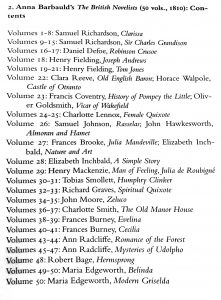Tuesday, January 15th / Course Introduction
 Samuel Johnson, [On Fiction], from Rambler, No. 4 (1750)
Samuel Johnson, [On Fiction], from Rambler, No. 4 (1750)
Anna Letitia Barbauld, “On the Origin and Progress of Novel-Writing” (1810). Currently available as a link to the Internet Archive; link to Baubauld pdf.
G.H. Lewes, “Recent Novels: French and English,” from Fraser’s Magazine, December 1847. Currently available as a link to the British Library
Henry James, “The Art of Fiction,” from Longman’s Magazine 4 (September 1884)
**
Tuesday, January 22nd / Critical Discourse I
Continue discussion of last week’s reading
Reading
Selections from Watt, The Rise of the Novel (1957) from Chapter 1, Section I (9-12), Section II (31-34) and Chapter 10 (290-301)
Barthes, “The Reality Effect” (1969)
Iser, “The Reading Process: A Phenomenological Approach.” New Literary History, vol. 3, no. 2, 1972, pp. 279-299. (pdf)
Catherine Belsey, Critical Practice (1980)
Culler, “Narrative” chapter from Literary Theory: a very short introduction (1997)
Critical Discourse Presentations: Written materials due no later than Tuesday, January 29th. You may submit them electronically to me via google docs or as attached .docs sent to eberle@uga.edu.
PMLA (Publications of the Modern Language Association of America) / Annelise Norman
Nineteenth-Century Literature (NCL) / Gabrielle Stecher
Novel: a forum on fiction / Jessica Lambert
Studies in the Novel / Emily Beckwith
ELH (English Literary History) / Morgan Richardson
Nineteenth-Century Contexts / Christian Gallichio
**
Wednesday, January 23rd
Dr. Donelle Ruwe will be speaking on “Mediocrity: aesthetics and music for girls in the long eighteenth century” at 4:30pm in Park Hall 265. You are also invited to the reception afterwards.
As graduate students, it is important that you participate in the life of the department outside of the classroom, particularly when a guest speaker works within your field or when a lecture addresses your current coursework.
Link to department website: http://english.uga.edu/events/content/2018/small-things-eighteenth-century-atlantic-world-dr-chloe-wigston-smith
**
Tuesday, January 29th / The Historical Novel I
Primary Sources:
Sir Walter Scott, Waverley (1814)
Scott’s General Preface to the Waverley Novels (1829)
Potential Secondary Sources: We’ll also be returning to Catherine Belsey’s “Critical Practice” today. Please bring your pdf to class.
From Georg Lukács, The Historical Novel, pp. 13-15 and pp. 19-64
[pdf of entire text available online. Please read only the sections noted above]
Michael Gamer, “Waverley and the Object of (Literary) History,” MLQ vol. 70, no. 4, December 2009, pp. 495-525.
Critical Discourse Presentations: Written materials due no later than Tuesday, February 5th. You may submit them electronically to me via google docs or as attached .docs sent to eberle@uga.edu.
European Romantic Review (ERR) / Michelle Chang
Studies in Romanticism (SIR) / Brianna Phillips
Victorians / Elizabeth Cagle
Victorian Literature and Culture / Stephanie Gibson
Victorian Studies / Kristina Going
**
Tuesday, February 5th / Narrative Voice
Primary Source:
Jane Austen, Emma (1816)
Potential Secondary Sources: We’ll be returning to Culler today: “Narrative” chapter from Literary Theory: a very short introduction (1997)
From Dorrit Cohn’s Transparent Minds: Narrative Modes for Presenting Consciousness in Fiction (v-vii; 99-121). Missing page 100-101 pdf HERE.
Some definitions of free indirect discourse or “narrated monologue” from Transparent Minds:
“A transformation of figural thought-language into the narrative language of third-person fiction” and “the technique for rendering a character’s thought in his own idiom while maintaining the third-person reference and the basic tense of narration” (Cohn 100)
“In sum, the narrated monologue is at once a more complex and a more flexible technique for rendering consciousness than the rival techniques. Both its dubious attribution of language to the figural mind, and its fusion of narratorial and figural language charge it with ambiguity, give it a quality of now-you-see-it, now-you-don’t that exerts a special fascination” (Cohn 107)
Class Presentation and Assigned Critical Reading:
Michelle Chang
Klemann, Heather M. “Ethos in Jane Austen’s Emma.” Studies in Romanticism, vol. 51, no. 4, 2012, pp. 503-532.
**
Tuesday, February 12th/ What is the Romantic Novel?
Primary Sources:
John Thelwall’s The Daughter of Adoption: a Tale of Modern Times (1801)
Class Presentation and Assigned Critical Reading:
Christian Gallichio has assigned excerpts from two critical sources, both available on this PDF. You’ll find citations below.
Behrendt, Stephen. “Questioning the Romantic Novel.” Studies in the Novel, vol. 26, no. 2, Summer 1994, pp. 5-25. [You are reading pp. 5-13 for today.]
Heydt-Stevenson, Jillian and Charlotte Sussman, Recognizing the romantic novel: new histories of British fiction. Liverpool UP, 2008. [You are reading the section entitled “The Case for Romantic Fiction” for today: pp. 19-26.]
*Vanity Fair Reading: Chapter I-Ch XI (1-130)*
**
Tuesday, February 19th / Why only Austen?
Primary Source:
Amelia Opie, Valentine’s Eve (1816)
Review of Valentine’s Eve and Emma
Available as a pdf on Internet Archive. Please read all three volumes of the 1816 London edition. Here is a link to the first volume, second volume, and third volume. Also available as a packet from Bel-Jean Printers.
Class Presentation and Assigned Critical Reading: Kristina Going has assigned two readings. The PDFs have been sent to you via email.
Johnson, Claudia L. “A Novel of Crisis.” Jane Austen: Women, Politics, and the Novel. The University of Chicago Press, 1988, pp. 1-27.
Cosgrave, Isabelle M. Selections from “Ch. 4: A surge in fiction writing; a surge in spiritual enquiry: Temper (1812), Valentine’s Eve (1816); Madeline (1822).” ‘White Lies’: Amelia Opie, Fiction, and the Quakers. University of Exeter, 2014, pp. 145-148, 159-171.
*Vanity Fair Reading: Chapter XII (131-269)*
**
Tuesday, February 26th / Narrative Voice and The Bildungsroman
Primary Source:
Charlotte Bronte, Jane Eyre (1847)
Class Presentation and Assigned Critical Reading:
Elizabeth Cagle
Lanser, Susan Sniader. Women Writers and Narrative Voice. Cornell UP, 1992. [You are reading the chapter on Jane Eyre: “Jane Eyre’s Legacy: The Powers and Dangers of Singularity”].
Stevens, Kevin. “‘Eccentric Murmurs’: Noise, Voice, and Unreliable Narration in Jane Eyre.” Narrative, vol. 26, no. 2, May 2018, pp. 201-220.
*Vanity Fair Reading: Chapter XXI-XXXI (269-385)*